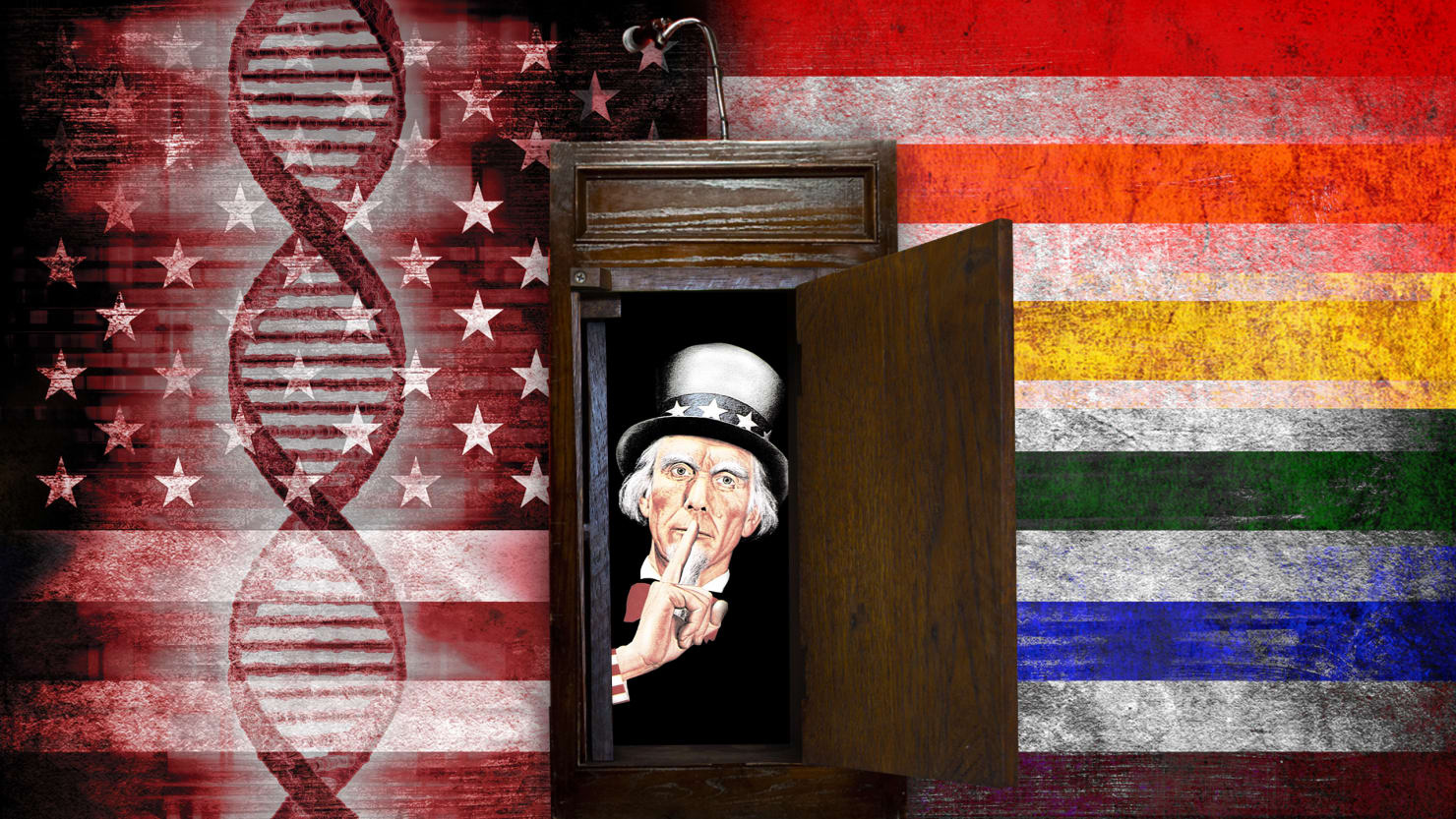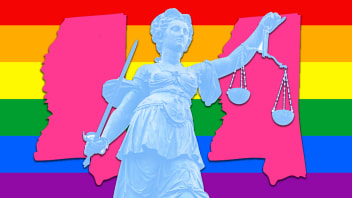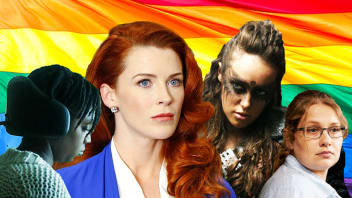|
| There is some research suggesting a link between being closeted and being anti-gay. But while the notion feeds many jokes, it also obscures very real homophobia. |

PHOTO ILLUSTRATION BY THE DAILY BEAST
CLOSET
The Weird Science of Homophobes Who Turn Out to Be Gay
There is some research suggesting a link between being closeted and being anti-gay. But while the notion feeds many jokes, it also obscures very real homophobia.
11.21.17 5:00 AM ET
2017 has been a banner year for the armchair psychological theory that anti-gay public figures are secretly gay themselves.
Never mind the long-running jokes and memes about Mike Pence covering up some secret homosexual identity. There have been actual examples this year of outspoken anti-LGBT figures exhibiting behavior that seems to contradict their political ideology.
The same idea emerges every time: The hypothesis is that their bigotry doesn’t just make their sexual behavior hypocritical, it actually functions as a cover for it, consciously or otherwise.
Recently, there has been former Ohio state Rep. Wesley Goodman, who resigned late last week after it came out that he had had sex with a man in his office.
In March, former Oklahoma state Sen. Ralph Shortey resigned after being hit with child prostitution charges for allegedly soliciting sex from a 17-year-old boy. Shortey has reportedly decided this week to plead guilty to a child sex trafficking charge.
Both Goodman and Shortey are married men who were clear political opponents of the LGBT community while in office.
After Shortey was arrested, the Associated Press noted that he “routinely” voted for anti-LGBT bills, quoting the director of the LGBT advocacy organization Freedom Oklahoma who said, “He was never vitriolic about it, but he would make the bad votes.”
RELATED IN ARTS AND CULTURE
More strident was Goodman who, as the Columbus Dispatch reported, “consistently touted his faith and conservative values,” with a Twitter bio that read: “Christian. American. Conservative. Republican.”
As more information about their alleged misdeeds emerges—Goodman now stands accused of fondling an 18-year-old man at a conservative event, and of pursuing several young gay men—there is a certain grim catharsis in seeing such hypocrisy exposed.
The LGBT community will never tire of bringing up the long history of Republican gay sex scandals every time new—and increasingly unsurprising—allegations emerge, precisely because they seem to be so predictable in hindsight.
(As GQ sarcastically put it in response to the Goodman news: “Anti-Gay Ohio Republican Resigns After, Surprise, Having Sex with a Man in the State Capitol.”)
A 2012 study in the Journal of Personality and Social Psychology generated a fair number of headlines that year—including The New York Times’ “Homophobic? Maybe You’re Gay”—for suggesting that some self-avowed straight people who showed signs of same-sex desire were more likely to hold discriminatory attitudes.
Two authors on the study—psychologists Richard M. Ryan and William S. Ryan—wrote in their accompanying New York Timesopinion piece that they had asked 784 college students to rate their sexual orientation on a 10-point scale and then told them to sort “images and words indicative of hetero- and homosexuality” into categories.
The “twist,” as they put it, were subliminal flashes of the words “me” or “other” before each image that can theoretically reveal subconscious bias based on how long it takes the subjects to sort images that don’t match their self-described sexual identity into the right category.
The result: The researchers isolated a “subgroup of participants”—more than “20 percent of self-described highly straight individuals”—who “indicated some level of same-sex attraction,” and who were “significantly more likely than other participants to favor anti-gay policies; to be willing to assign significantly harsher punishments to perpetrators of petty crimes if they were presumed to be homosexual; and to express greater implicit hostility toward gay subjects.”
“Thus our research suggests that some who oppose homosexuality do tacitly harbor same-sex attraction,” they concluded.
The psychological mechanism behind this subgroup’s anti-LGBT vitriol is, in theory, relatively simple: They are taking out their own issues with sexual identity on other people.
As Netta Weinstein, the study’s lead author, said in a press release, they “may be threatened by gays and lesbians because homosexuals remind them of similar tendencies within themselves.” So if you’re an American politician, there may be no more effective way to prove to yourself that you’re straight than to target LGBT people.
The 2012 study is certainly suggestive. It’s continually cited whenever it seems to apply to a homophobic figure, like after Pulse nightclub gunman Omar Mateen was rumored to have frequented the LGBT nightclub in the buildup to the shooting.
There are other studies that have come to similar conclusions. As Science magazine reported after Pulse, there is a “scattering of research” that suggests “some conflicted gay men might indeed be homophobic,” like a small 1996 study in the Journal of Abnormal Psychology that measured penile arousal and found a link between “homophobia” and “homosexual arousal.”
But the keyword in all of the above literature is “some.”
There is, at this point, enough research in this area to suggest that there may be something deeper to the armchair psychology. But the “secretly gay homophobe” theory is far from being a complete explanation of anti-LGBT prejudice in American politics.
Twenty percent of people who describe themselves as “highly straight” is still 10 percent fewer than the 32 percent of Americans who oppose same-sex marriage.
Just because that 20-percent subgroup is “significantly more likely” to tout an anti-LGBT ideology doesn’t mean we can assume someone like Mike Pence is likely to be covering up a secret past as a gay clubgoer just because of his anti-LGBT track record. So-called closet cases may be abundant, but there’s no way to prove that every Republican who tries to legalize anti-LGBT discrimination is hiding something.
In fact, overgeneralizing and joking as if that were the case may hurt LGBT people.
On Twitter, comedian Cameron Esposito, herself a lesbian, has criticized the homophobic undertones of the constant Mike Pence jokes—and has called out the media for being seemingly more interested in the salacious “homophobe caught having gay sex” story than in the mistreatment of LGBT people writ large.
I don't believe Mike Pence is secretly gay
Gay ppl are cool
"Pence is secretly gay."
Well idk but much more importantly: Pence is un-secretly an asshole who patrols other's lives.
Straight ppl: Mike Pence says he's one of you. I know ur compassionate. He isn't.
COME GET YER BOY
"Homophobe caught having gay sex" is a more interesting headline than "queer person repeatedly misunderstood & targeted by straight world."
As queer writer Lindsay King-Miller wrote earlier this year, “Making fun of ‘closet cases’ only reinforces homophobia” because it “underscores the idea that being gay is shameful and should be hidden.”
In King-Miller’s view, it provides an “excuse for straight people” to laugh at a man like Goodman or Shortey while still feeling like “they’re allied with The Cause.”
As it becomes less and less acceptable for comics and late-night hosts to make fun of people just for being gay, the recurrent trope of the closeted anti-LGBT politician can serve as a release valve for society’s lingering casual homophobia. They create a context in which it’s safe for liberals to laugh at homosexuality.
Indeed, when I overhear jokes about these cases, I might laugh—but I’m also wondering how many of the straight people in the audience are laughing at hypocrisy and how many of them are laughing at the mere idea of a man having sex with another man.
Because the less obvious counterpoint to the theory that virulently anti-LGBT people are closeted is the experiential knowledge that people of various political backgrounds are often less OK with LGBT people than they let on.
There may be some truth to the notion that loud expressions of homophobia are a case of “protesting too much.”
But in the absence of further data—and in a world where sex between men is still a punchline in and of itself—it may do more harm than good.
Sometimes people hate the difference within themselves. Sometimes people just hate difference. But either way, hatred doesn’t necessarily need to be explained in order to be combatted.
There are better ways to get anti-LGBT politicians out of office, after all, than waiting for them to get embroiled in a sex scandal.








No comments:
Post a Comment